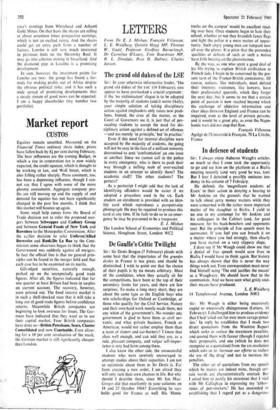Market report
CUSTOS
Equities remain unsettled. Measured on the Financial Times ordinary share index, prices have fallen back by 81 per cent during February. The bear influences are the coming Budget, in which a rise in corporation tax is now widely expected, the credit squeeze, which is thought to be working at last, and Wall Street, which is also falling rather sharply. Press comment, too, has been a depressing influence, though I can- not say that I agree with some of the more gloomy assessments. Aggregate company pro- fits are still moving up and the supply of and demand for equities has not been significantly changed in the past few months. I think that this market will bounce up again.
Some small help comes from the Board of Trade decision not to refer the proposed mer- gers between Schweppes and Cadbury Group and between General Foods of New York and Rowntree to the Monopolies Commission. After the ea'rlier decision to refer Unilever/Allied Breweries and Rank./De La Rue to the Com- mission some observers began to think that the Government was suddenly against all mergers. In fact the official line is that no general prin- ciples can be found in the merger field and that each case has to be examined on its merits.
Gilt-edged securities, naturally enough, perked up on the unexpectedly good trade figures. After all, the figures indicated that for one quarter at least Britain had been in surplus on current account. The recovery, however, soon petered out. The fixed interest market' is in such a shell-shocked state that it will take a long run of good trade figures before confidence
returns. Meanwhile British companies are beginning to look overseas for loans. The Ger- mans have indicated that they want us to use their capital market. Four British companies have done so—British Petroleum, Sears, Charter Consolidated and now Courtaulds. Even allow- ing for a 10 per cent revaluation of the mark, the German market is still significantly cheaper than London.


































 Previous page
Previous page